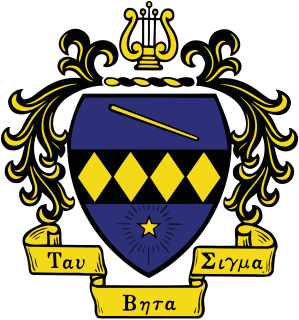Sigma Phi Beta (ΣΦΒ) may refer to:
- Sigma Phi Beta (fraternity), a college fraternity for gay, straight, bisexual, and transgender men.
- Sigma Phi Beta (sorority), a defunct sorority belonging to the National Panhellenic Conference.
Sigma Phi Beta (ΣΦΒ) may refer to:

Dartmouth College is host to many Greek organizations, and a significant percentage of the undergraduate student body is active in Greek life. In 2005, the school stated that 1,785 students were members of a fraternity, sorority, or coeducational Greek house, comprising about 43 percent of all students, or about 60 percent of the eligible student body. Greek organizations at Dartmouth provide both social and residential opportunities for students, and are the only single-sex residential option on campus. Greek organizations at Dartmouth do not provide dining options, as regular meals service has been banned in Greek houses since 1909.

The National Panhellenic Conference (NPC) is an umbrella organization for 26 (inter)national women's sororities throughout the United States and Canada. Each member group is autonomous as a social, Greek-letter society of college women and alumnae.

Phi Beta Sigma Fraternity, Inc. (ΦΒΣ) is a historically African American fraternity. It was founded at Howard University in Washington, D.C. on January 9, 1914, by three young African-American male students with nine other Howard students as charter members. The fraternity's founders, Abram Langston Taylor, Leonard Frances Morse, and Charles Ignatius Brown, wanted to organize a Greek letter fraternity that would exemplify the ideals of Brotherhood, Scholarship and Service while taking an inclusive perspective to serve the community as opposed to having an exclusive purpose. The fraternity exceeded the prevailing models of Black Greek-Letter fraternal organizations by being the first to establish alumni chapters, youth mentoring clubs, a federal credit union, chapters in Africa and a collegiate chapter outside of the United States. It is the only fraternity to hold a constitutional bond with a historically African-American sorority, Zeta Phi Beta (ΖΦΒ), which was founded on January 16, 1920 at Howard University in Washington, D.C., through the efforts of members of Phi Beta Sigma.

Tau Beta Sigma Honorary Band Sorority, is a co-educational service sorority.
Professional fraternities, in the North American fraternity system, are organizations whose primary purpose is to promote the interests of a particular profession and whose membership is restricted to students in that particular field of professional education or study. This may be contrasted with service fraternities and sororities, whose primary purpose is community service, and social fraternities and sororities, whose primary purposes are generally aimed towards some other aspect, such as the development of character, friendship, leadership, or literary ability.
While the traditional social fraternity is a well-established mainstay across the United States at institutions of higher learning, alternatives – in the form of social fraternities that require doctrinal and behavioral conformity to the Christian faith – developed in the early 20th century. They continue to grow in size and popularity.
The Mother of Fraternities refers to two colleges: Union College and Miami University, both of which founded many fraternities.
East Carolina University is home to sixteen social fraternities, ten social sororities, five historically African-American fraternities, and four historically African-American sororities. There are also sixteen honor fraternities, and twelve service or religious fraternities/sororities.
The North American fraternity and sorority system began with students who wanted to meet secretly, usually for discussions and debates not thought appropriate by the faculty of their schools. Today they are used as social, professional, and honorary groups that promote varied combinations of community service, leadership, and academic achievement.
The College of William & Mary fraternity and sorority system recognizes chapters of national organizations belonging to the Panhellenic Council, the Interfraternity Council (IFC) and the National Pan-Hellenic Council, and also recognizes one local fraternity without Greek letters and the local chapter of one national fraternity that abandoned membership in an inter-Greek consortium. The school also offers a variety of honor and co-ed service fraternities as well. The first collegiate fraternity within the present borders of the United States, the Latin-letter F.H.C. Society, was founded at the College of William & Mary on November 11, 1750. The new country's first Greek-letter fraternity was founded at the College on December 5, 1776, though the Phi Beta Kappa Society no longer is a social fraternity but, instead, the leading American academic honor society. Some fraternities and sororities are limited to graduate students at William & Mary, while others may only be joined at the undergraduate level. Still other Greek-letter organizations operate without recognition or approval from college administrators.
The expansion of Greek letter organizations into Canada was an important stage of the North American fraternity movement, beginning in 1879 with the establishment of a chapter of Zeta Psi at the University of Toronto. In 1883 the same fraternity established a chapter at McGill University. Other early foundations were Kappa Alpha Society at Toronto in 1892 and at McGill in 1899, and Alpha Delta Phi at Toronto in 1893 and at McGill in 1897. The first sorority, Kappa Alpha Theta, was established at Toronto in 1887. In 1902, the first international chapter of Phi Delta Theta was established at McGill University as the Quebec Alpha. The development of the fraternity system in Canada has made great progress in these two universities. In 1927 Baird's Manual of American College Fraternities reported the existence of 42 chapters at the University of Toronto and of 23 chapters at McGill University. A few chapters were also reported from the University of British Columbia, University of Calgary, Carleton University, Dalhousie University, University of Manitoba, Queen's University, University of Western Ontario, McMaster University, Wilfrid Laurier University, University of Waterloo, Brock University and University of Alberta.
North Carolina Agricultural and Technical State University is host to 17 national fraternity and sorority chapters. The Greek system at North Carolina A&T is very selective, with roughly 1.4% of undergraduate male students and 1.2% of undergraduate female students involved in fraternities and sororities.

Fraternities and sororities at University of Virginia, include the collegiate organizations on the grounds of the University of Virginia in Charlottesville, Virginia. First founded in the 1850s with the establishment of a number of fraternities, the system has since expanded to include sororities, professional organizations, service fraternities, honor fraternities, and cultural organizations. Fraternities and sororities have been significant to the history of the University of Virginia, including the founding of two national fraternities Kappa Sigma (ΚΣ) and Pi Kappa Alpha (ΠΚΑ).